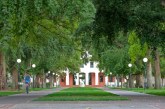 Last week Brice Harris chancellor of the Los Rios Community College District, and Linda Katehi, chancellor of the University of California, Davis wrote an op-ed in the Sacramento Bee in which they argue against those who “worry that California – mired in one of the worst financial crises in the state’s history – can no longer sustain its commitment to its students or the master plan.”
Last week Brice Harris chancellor of the Los Rios Community College District, and Linda Katehi, chancellor of the University of California, Davis wrote an op-ed in the Sacramento Bee in which they argue against those who “worry that California – mired in one of the worst financial crises in the state’s history – can no longer sustain its commitment to its students or the master plan.”
Instead they argue that “there is a renaissance in the air.”
Instead they point to cooperation between UC Davis and Sacramento City College. What? Are you kidding me? Apparently not.
Here’s what they write, “Indeed, we think there is a renaissance in the air. Never before has cooperation been greater among the heads of California’s institutions of higher education. As proof, look no further than a ceremony held in Davis last week to celebrate the groundbreaking for what will be the first community college center on a University of California campus.”
They continue, “The new Sacramento City College Davis Center, scheduled to open in spring 2012 on the UC Davis campus, was conceived to address one of the master plan’s primary goals and persistent challenges: to increase the number of community college students who transfer to a four-year university.”
And while that in and of itself may be a laudable goal, it somehow pales in comparison with the overall plight of the UC System.
They continue, “And the California economy will enjoy a strong return, too. If just 2 percent more Californians earn associate of arts degrees and 1 percent more earn a bachelor of arts or bachelor of science degree, the state’s economy would grow by $20 billion, state and local tax revenue would increase by $1.2 billion a year, and 174,000 new jobs would be created, according to a study by the Campaign for College Opportunity.”
The problem is right now, we are not going to produce two percent more college graduates? Why? Because there are fewer people likely to be able to afford and attend college.
They go on to note the green tech wave that has “jolted” the state’s economy. “At UC campuses, energy-related research funding has quadrupled in four years, to $126 million; 27 energy companies had been founded on UC technologies through 2009. At California State University campuses, students have access to new programs focused on “green” industries, including certificates in sustainable resource management, green business operations and sustainable business design. At California community colleges, thousands of students are preparing for high-wage green-tech jobs, including solar roofer ($45,000-a-year median income) and wind turbine installer ($52,000 median yearly income).”
The problem is that economy has not been jolted and so while they can point to the innovative LEED certified buildings at UC Davis’ West Village, it does not seem to make up for the huge struggles we continue to face as a educational system and as a state.
They write, “The new Davis center will be a living laboratory in sustainability and energy efficiency. It will be housed in a LEED-certified silver building at UC Davis West Village, a planned residential community for students, faculty and staff that will become one of the world’s first large-scale “net zero energy” communities. That means the 205- acre community will produce as much energy as it uses. Food scraps will fuel a biodigester that will help light dormitory rooms and homes, using technology developed by UC scientists. And designs for the highly efficient lighting fixtures will come out of the UC Davis California Lighting Technology Center.”
As Gregg Campbell wrote Sunday in response, “There may be something in the air, or in the sky, or in the heavens, but evidence on the campuses and in the classrooms defies the notion of a renaissance. “
He continues, “In the face of these realities, Harris and Katehi cite the case of a new Sacramento City College center opening on the UC Davis campus. Bravo! But how well are students, faculty and staff at Sacramento City College on Freeport Boulevard being supported?”
Furthermore, “In supporting their “renaissance in the air,” the authors cite a Campaign for College Opportunity study that states if … yes, if just 2 percent more Californians who cannot afford rising tuition enroll in nonexistent classes – if, if, if.”
“And then the authors refer to green technology – devoting an entire paragraph to its benefits. But wait. The green technology jolts – I’m seeing Jovian thunderbolts here – are largely federal initiatives,” Mr. Campbell writes.
He concludes, “No thoughts of renaissance can alter the overwhelming evidence that California is no longer sustaining commitment to either its students or the master plan.”
I have seen Ms. Katehi defended on these pages on numerous occasions, but I really have to question her connection to the on-the-ground realities. This is a renaissance? To me this would be akin to celebrating a remodel of the Coliseum in Rome as an example of the revitalization of the Roman empire at the same time the Visigoths storms the hills on the exterior of town in attacks that would eventually bring down the Empire. Sure the Renaissance would come, but it would be a look and dark age.
No amount of collaboration with Community Colleges or investment in green technology is going to save us from the impending doom unless we find away to honor our commitments not just to higher education, but to K through 12. We are cutting educational services to the very students who can least afford it. We are raising tuition. We are as a whole making higher education less affordable.
Now is the time to fight and scrap and try to save the UC System, there is no Renaissance. There is only pain and hardship. But maybe it is a bit difficult to see this through the lenses of Ms. Katehi’s $400,000 cash-cow as her students are starving metaphorically for more education, more classes, and more accessibility.
—David M. Greenwald reporting






BP….CEO Hayward, UC…. Chancellor Katehli
…extremely well-paid “suits” hired to be the public face and do the PR work. No one really believes this stuff.
I would also point out that UCD has a nasty habit of not being particularly cooperative in accepting community college transfer students. My son had extreme difficulty transferring from Sac City, because the UCD counselor was poorly informed on transfer requirements. As a result, my son unfairly had to spend an extra year at Sac City before he was accepted into UCD – accepted after pressure was brought to bear by the Sac City transfer counselor. This problem of UCD accepting very few community college transfer students was so pervasive, Sac City launched an intensive investigation into the reasons why.
Don’t pay much attention to what Katehi says, but what she does. Talk is cheap.
Wow, a lot of churlish attitude and over-inflated rhetoric here. Cash-cow? Visigoths?! Hayward? You and others seem to have unrelenting and disproportionate hostility toward Chancellor Katehi, since even before her arrival here.
Ok, the chancellor co-authored an overly cheerful op-ed touting the cooperation between UCD and the community college. Surely that cooperation is, in itself, a good thing. Closer collaboration between UC and community colleges is going to be essential for many students. Perhaps eventually they will even address the concerns ERM mentions regarding transfer requirements. It would certainly be to their advantage to do so.
Sheesh.
Don: By now you should know that I pretty much shoot from the hip, you give me fodder and I’ll go for it. I agree, by itself the plan is a good one. The problem is that it’s way too little and probably way too late to make any meaningful difference. I think the Visigoth metaphor is a good one, the public education system has been raided repeatedly in the last few years and it may yet fall or take on a very different form. To argue that we have a renaissance is very insincere and non-believable.
[i]”I would also point out that UCD has a nasty habit of not being particularly cooperative in accepting community college transfer students.”
I don’t know when it was your son tried to transfer from Sac City, but now UC Davis has a transfer admission guarantee ([url]http://uctransfer.universityofcalifornia.edu/pdf/tag_matrix.pdf[/url]) program (TAG). Six other UC campuses have this same system for JC transfers. With TAG, there is “early admission notification and specific guidance on major preparation and general education coursework.”
[i]”… the UCD counselor was poorly informed on transfer requirements.”[/i]
That was probably just one new or poor employee back in the day. TAG lays things out precisely and avoids such problems.
ERM-My daughter had much the same experience with transferring from a community college to UC.I must agree with David on the hype factor. The cost benefit approach to selling UC is not going to go far in this economy. Until classes are affordable and available at UC, many middle class families will choose private schools with certification programs.
Article in the SF Chronicle this month:
“U. of California to Propose Administrative Overhaul to Save $500-Million”
http://chronicle.com/article/U-of-California-to-Propose/65602/
I am still fuming.
After months of debate over lower tax revenue flowing into the UC system, and higher fees levied on the students, cut athletic programs… we only now get to read about this wonderful idea to consolidate for operational efficiency?
This is indicative of the fundamental reason why many people do not trust public entities with fiscal responsibility and demand smaller government. If the UC system was fully private and for profit, these efficiencies would have been analyzed and implemented years, if not decades, ago.
[i]”If the UC system were fully private and for profit [b]and operating in a competitive industry with low profit margins[/b], these efficiencies would have been analyzed and implemented years, if not decades, ago.”[/i]
Fixed.
One of the best lines I heard when I was studying economics as an undergrad came from a brilliant Englishman, a PhD from the University of Chicago, a student of Nobel Laureate George Stigler. He said, [quote]The first thing you will notice when you look at the management structure of a publicly regulated monopoly is that there are an excessively large number of ‘top executives’ and each of them needs two secretaries–one who can type.”[/quote] The point of course is that not every “for profit” enterprise is run with perfect efficiencies; and many of them are able to be inefficient in certain respects for the long run because their industry is not cut-throat competitive. Of course, a non-competitive industry* can (through regulatory, technological or other external changes) become competitive at some point in the future. And when that happens, slack companies go broke**, because they develop cultures internally which can never win against real competition.
*Most industries are at some point not fully competitive. The leading companies in most young industries were usually just the first ones in and they capture most of the market at some point. However, economic theory–as well as empirical evidence–shows that the profits will attract competition and over time–sometimes a long time–the advantages of the first companies in will erode.
**I don’t recall the precise numbers but I recall reading many years ago a study of the companies listed in the S&P 500 every year from early in the 20th C. to around 1995; and the study noted that something like 30% of all companies in that index in one given year had gone out of business 30 years later.
My wife’s experience in transferring from SCC to UCB was quite the opposite. She paid close attention to the admission requirements, made sure all the details were taken care of, and was accepted as a transfer student in Econ so easily that I didn’t believe it until we actually went to Berkeley for her orientation.
wesley506: “My wife’s experience in transferring from SCC to UCB was quite the opposite. She paid close attention to the admission requirements, made sure all the details were taken care of, and was accepted as a transfer student in Econ so easily that I didn’t believe it until we actually went to Berkeley for her orientation.”
The way it appeared to me was UCD was skimming off the top community college students who had a GPA of 3.5 or better, then discouraging the rest, even if they qualified to transfer. This was what was being investigated by Sac City.
rich rifkin: “That was probably just one new or poor employee back in the day. TAG lays things out precisely and avoids such problems.”
Sac City launched an investigation, bc the problem was so pervasive. Whether TAG was the result of that investigation, I don’t know.